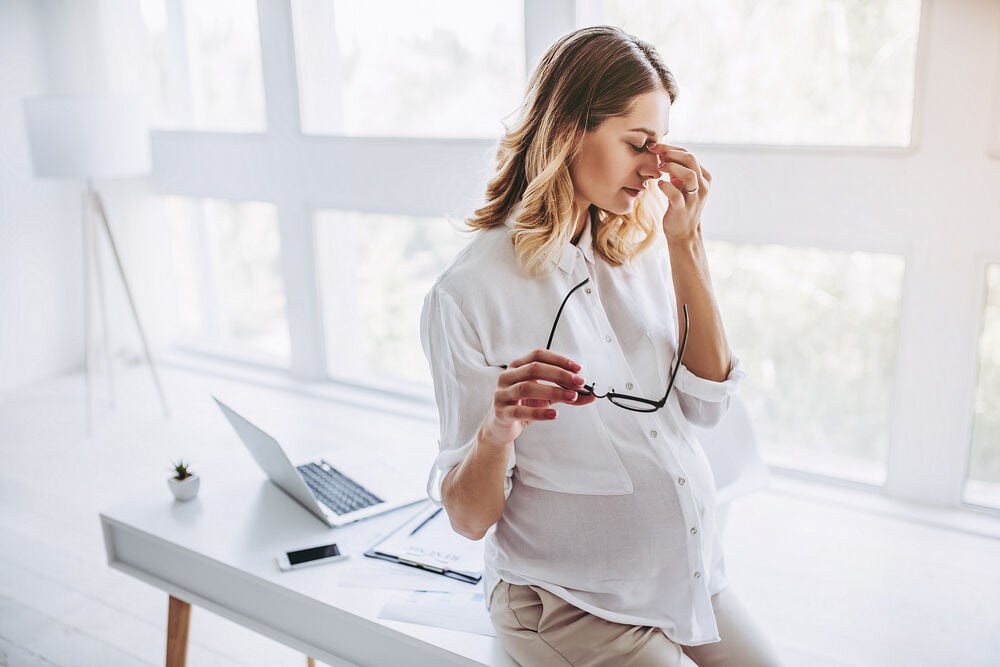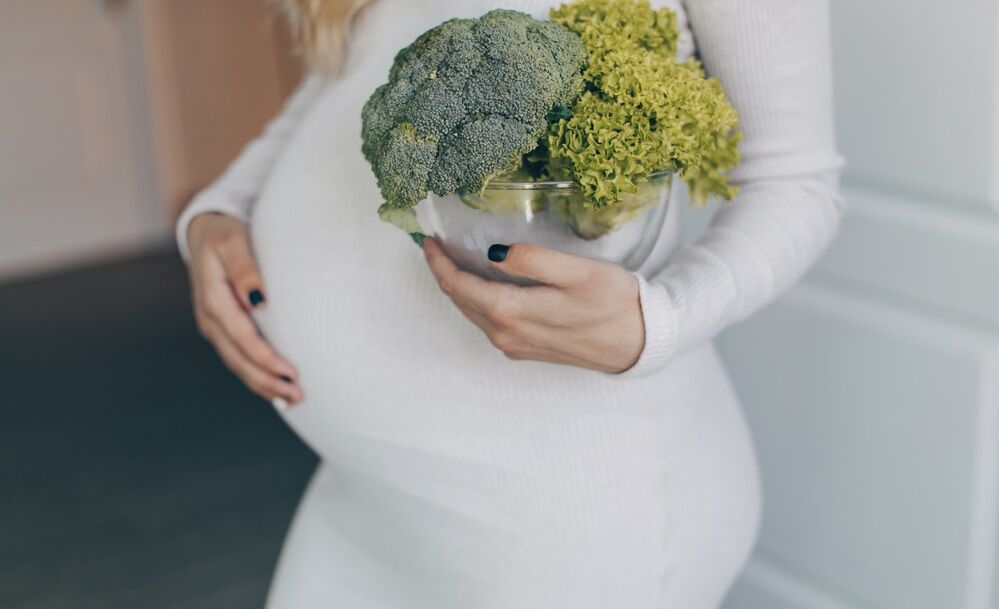There are a few things that most women can expect during their pregnancy. In addition to fatigue, constipation, and mood swings, an increased risk for anemia is also one of them. Find out the risk factors, symptoms, and possible treatment to avoid any complications.
-
Tracking cycle
-
Getting pregnant
-
Pregnancy
-
Help Center
-
Flo for Partners
-
Anonymous Mode
-
Flo app reviews
-
Flo Premium New
-
Secret Chats New
-
Symptom Checker New
-
Your cycle
-
Health 360°
-
Getting pregnant
-
Pregnancy
-
Being a mom
-
LGBTQ+
-
Quizzes
-
Ovulation calculator
-
hCG calculator
-
Pregnancy test calculator
-
Menstrual cycle calculator
-
Period calculator
-
Implantation calculator
-
Pregnancy weeks to months calculator
-
Pregnancy due date calculator
-
IVF and FET due date calculator
-
Due date calculator by ultrasound
-
Medical Affairs
-
Science & Research
-
Pass It On Project New
-
Privacy Portal
-
Press Center
-
Flo Accuracy
-
Careers
-
Contact Us
Anemia in Pregnancy: Symptoms, Causes, Treatment


Every piece of content at Flo Health adheres to the highest editorial standards for language, style, and medical accuracy. To learn what we do to deliver the best health and lifestyle insights to you, check out our content review principles.
Overview
The human body needs red blood cells in order to survive. Red blood cells carry hemoglobin, a complex protein that contains molecules of iron. These molecules carry oxygen from the lungs to the rest of the body.
During pregnancy, the body increases the production of blood by about 20–30 percent, which increases the need for iron and vitamins to make hemoglobin.
If you’re not getting enough iron or other nutrients such as vitamin B12 and folic acid (vitamin B9), your body will struggle to produce enough hemoglobin to make additional blood. As a result, you might develop a condition known as pregnancy anemia.
Anemia during pregnancy can lead to symptoms such as weakness, tiredness, fatigue, paleness, and in some severe cases even fainting, rapid heartbeat, and difficulty breathing. Many pregnant women have mild anemia. This is usually normal and affects almost 50 percent of pregnant women. It is not life-threatening. If the anemia becomes too severe or if it’s left untreated, though, it can lead to severe complications including preterm delivery and low birth weight. Anemia can also increase the risk of postpartum infections in women.
Types of anemia
Several types of anemia can appear in pregnancy. The most common types include:
- Iron-deficiency anemia. It’s been estimated that 15–25 percent of all pregnant women experience iron deficiency. It’s the leading cause of anemia in the United States and the most common type of anemia during pregnancy. Seventy-five percent of all anemia in pregnant women is iron-deficiency anemia. During pregnancy, the fetus uses the mother’s red blood cells to grow and develop. If the mother has excess red blood cells stored in her bone marrow, then the baby can use those. Women who don’t have enough red blood cells stored up can develop iron-deficiency anemia. When there’s not enough iron in the body, you may experience fatigue and be less able to fight off infections.
- Folate-deficiency anemia. Another common type of anemia in pregnancy is folate-deficiency anemia. Folate is a water-soluble vitamin that the body needs to produce new cells, including red blood cells. The vitamin is found naturally in foods like green leafy vegetables and citrus fruits. When pregnant women don’t get enough folate from their diets, their bodies struggle to produce enough red blood cells. If left untreated, folate deficiency can lead to birth defects such as neural tube abnormalities, congenital heart defects, low birth weight, and also peripheral neuropathy in mothers-to-be.
- Vitamin B12 deficiency. Vitamin B12 also plays a very important role in making red blood cells. In B12- or B9-deficiency anemia, red blood cells are big (that is why it is also called megaloblastic anemia) and have a different shape than healthy ones. Foods rich in vitamin B12 include dairy products, eggs, fish, meat, and poultry. A vitamin B12 deficiency during pregnancy can lead to preterm labor.
Risk factors for anemia in pregnancy
Although all pregnant women are at risk of developing anemia, the risk is higher if you:
- Are carrying multiples
- Have had two pregnancies close together
- Don’t get enough iron, folate, or vitamin B12
- Had anemia before your pregnancy
- Are vomiting often due to morning sickness
- Have a gastrointestinal tract disease, such as Crohn’s disease or chronic autoimmune gastritis, or had surgery on your stomach
- Are a strict vegan
Take a quiz
Find out what you can do with our Health Assistant
Symptoms of anemia during pregnancy
Symptoms of anemia while pregnant can be mild and often go unnoticed. They’re similar to general pregnancy symptoms that you might experience even if you’re not anemic. Regardless of whether you have symptoms or not, your doctor will perform a routine blood test to check for anemia at one of your prenatal visits.
The most frequent symptoms of anemia in pregnancy are:
- Feeling weak and tired
- Paleness of the skin
- Feeling lightheaded
- Trouble concentrating
- Shortness of breath or chest pain
- Rapid or irregular heartbeat
- Cold hands and feet

If you’re concerned about any of the symptoms or if something doesn’t feel right, speak to your doctor right away.
Causes of anemia during pregnancy
One of the leading underlying causes of anemia is iron deficiency. This happens when the body doesn’t get enough iron to produce hemoglobin.
Another cause of anemia in pregnancy is folate deficiency. Pregnant women need higher levels of folate for the healthy growth and development of the baby.
One of the leading underlying causes of anemia is iron deficiency. This happens when the body doesn’t get enough iron to produce hemoglobin.
Women who are vegans or have certain gastrointestinal tract diseases are also more likely to develop vitamin-B12-deficiency anemia.
Diagnosis
Your doctor will perform a routine blood test to check for anemia at your prenatal appointments. Even if you don’t show signs of anemia during the first trimester, your doctor might recommend that you get re-tested in your second or third trimester.
The most common blood tests that can detect anemia include:
Hemoglobin test. A hemoglobin test measures the amount of hemoglobin in your blood. If you have low hemoglobin during pregnancy, it is a sign that you have anemia. A healthcare professional will draw blood from a vein in your arm using a small needle. They will collect a small amount of blood into a test tube or vial. It usually takes less than five minutes, and you may only feel a little sting when the needle goes in and out.
Hematocrit test. A hematocrit test measures the percentage of blood cells in your blood. Having too few can be a sign of anemia. A blood sample will be drawn with a needle from a vein. The process is not harmful, and you might only feel a small sting. You’ll be able to resume normal activities afterward.
Complete blood count test. A complete blood count is another type of common test that measures the number and type of cells in your blood. A healthcare professional will take a blood sample from a vein in your arm.
In some cases, your doctor may order some other tests to differentiate between different types of anemia.
Treating anemia while pregnant
If you have iron-deficiency anemia, your doctor will recommend taking iron supplements. The supplements will contain a ferrous form of iron that your body will absorb easily. In most cases, iron supplements are the only treatment you’ll need to treat the effects of anemia. The recommended dose for pregnant women is around 120 milligrams of iron every day.
If your anemia is caused by vitamin B12 deficiency, your doctor will probably prescribe vitamin B12 injections. You can take vitamin B12 medicine by mouth, but very high doses will be needed.
In most cases, iron supplements are the only treatment you’ll need to treat the effects of anemia.
If the anemia is a result of nutritional deficiencies, changing to an iron and vitamin-rich diet can help alleviate the symptoms.
Your specific treatment for pregnancy anemia will be based on:
- Your pregnancy
- Your overall health
- Your medical history
- The type and severity of the condition
- The extent of the disease
- Your tolerance for specific medications and therapies
- Your opinion or preference
Ways to prevent pregnancy anemia
Eating a healthy and balanced diet can help keep your levels of iron and vitamins at a normal level. Good pre-pregnancy nutrition will not only help prevent anemia, but it will also help build other nutritional stores in the body. Your doctor will likely recommend a diet rich in iron. Good sources of iron include:
- Meats including beef, lamb, and liver
- Poultry including chicken, duck, and turkey
- Beans including lima beans and green peas
- Egg yolks
- Whole-grain products
- Nuts
- Seafood including clams, mussels, oysters, sardines, and anchovies
- Leafy greens from the cabbage family, including broccoli, kale, turnip greens, and collards

Your doctor might also recommend including more vitamin-B12-rich foods into your diet. Good sources of vitamin B12 are:
- Clams
- Liver
- Fortified cereal
- Fish (e.g., trout, salmon, and tuna)
- Milk
- Cheese
- Eggs
Also, make sure to include foods that are rich in folate to prevent folate deficiency. Experts recommend that women who are pregnant should take at least 400 micrograms of folic acid. Good sources of folate are:
- Leafy green vegetables
- Citrus fruits and juices
- Dried beans
- Breads and fortified cereal
When to see a doctor
If you think you’re experiencing symptoms that suggest anemia, see your doctor immediately. Anemia during pregnancy isn’t something you should self-diagnose or treat. Instead of taking iron or vitamin supplements on your own, get a professional opinion. Taking large amounts of iron might damage your liver and cause other side effects. Your doctor will perform the required blood tests to check for signs of pregnancy anemia and recommend the right treatment for you.


Hey, I'm Anique
I started using Flo app to track my period and ovulation because we wanted to have a baby.


The Flo app helped me learn about my body and spot ovulation signs during our conception journey.


I vividly
remember the day
that we switched
Flo into
Pregnancy Mode — it was
such a special
moment.
Real stories, real results
Learn how the Flo app became an amazing cheerleader for us on our conception journey.




